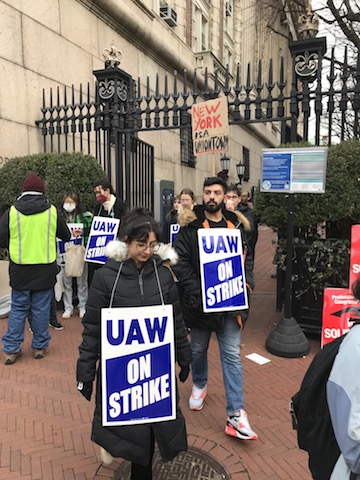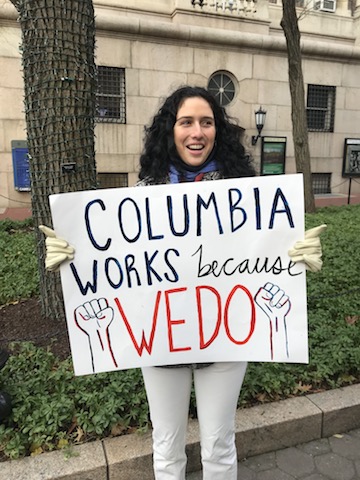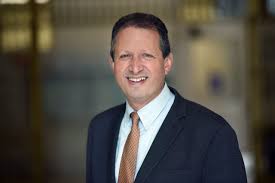NEW YORK, N.Y.—More than 100 striking graduate student workers and supporters circled through the gates of Columbia University at West 116th St. and Broadway on December 8, chanting, “Picket line means don’t cross“ to the beat of a quartet of drummers. The same message was chalked on the sidewalk, behind a large inflatable effigy of a fat cat choking a worker, donated by the Teamsters Union.

“Columbia needs us. We grade the papers, we facilitate the courses, we teach the classes. Historically, we’re a source of cheap labor,” says Kit Hermanson, a teaching assistant and Ph.D. candidate in religion.
Hermanson, is a member of the Student Workers of Columbia union’s hardship-fund committee, which coordinates donations to help strikers with emergency medical care, rent, and groceries. When Hermanson first arrived at Columbia from Arizona, they were getting a stipend of $31,600 for the nine-month academic year — and spending $2,100 a month to rent a studio apartment in a university-owned building.
“I took out $50,000 in student loans to pay my rent,” Hermanson told LaborPress.
The Columbia union, part of United Auto Workers Local 2110, represents about 3,000 graduate student workers. It went on strike Nov. 3, after more than two-and-a-half years of contract negotiations.
The union’s four main demands are getting paid a living wage; stronger protections against sexual harassment, discrimination, and power-based bullying; comprehensive health care, including vision and dental care; and full union recognition. The National Labor Relations Board [NLRB] ruled that any graduate student who gets paid to do teaching or research was eligible for the union, says Johannah King-Slutsky, a Ph.D. candidate who is an instructor in English and comparative literature. But the university has refused to give the union a list of people who are eligible, or even a list of how many workers in what job titles are, says Hermanson.
“If the NLRB says they should be part of the union, they should be,” King-Slutsky says.
Student Workers of Columbia also filed two unfair-labor-practice charges with the National Labor Relations Board before the strike began, says bargaining-committee member Mandi Spishak-Thomas, a fourth-year Ph.D. candidate in social work. One, she says, was because while bargaining was already in progress, the university unilaterally refused to give graduate workers a 3% raise they were due. The other was because it also unilaterally reduced the stipend payment given at the beginning of the academic year from $10,000 to $2,000.
Spishak-Thomas suspects the university deliberately delayed the stipend payment until later in the year so graduate workers would be low on cash if they went on strike.
“They got rid of our safety net,” she says. “It underlines how important our demands are.”
On Dec. 2, a university human-resources official sent graduate workers an email stating that it would give job assignments for the spring term to those currently working, those not currently on assignment, and strikers who return to work by December 10. Those still on strike after that would only get assigned to positions “if available.”
Student Workers of Columbia interpreted that as a threat to permanently replace them. In most departments, bargaining-committee member Tristan Du Puy told LaborPress, assignments for both semesters are given before the academic year starts. “These are not assignments we have to apply for at the end of December,” he said. “These positions had been allocated, and they now threaten to reopen them and potentially hire someone else to fill them.”
The union plans to file another unfair-labor-practice charge for retaliation, says Spishak-Thomas. Hiring permanent replacements is legal in an economic strike, but not in one where unfair-labor practice charges are pending.
Columbia’s director of media relations did not respond to an email from LaborPress.
University recalcitrant

Columbia has resisted graduate-student workers’ attempts to unionize for years. They voted for UAW representation by a margin of more than 70% in December 2016, but the university contested the results, challenging 647 of the 2,200-odd ballots cast on the grounds of “inconsistent handling of voter-identification procedures.” The NLRB rejected those allegations in December 2017, saying that at most, four ballots might have been affected.
Student Workers of Columbia has been in contract talks with the university since 2019. The administration hired longtime management-side lawyer Bernard Plum, who is also currently representing Major League Baseball in its lockout of the players, to negotiate for it. He is getting paid $1,500 an hour, says Spishak-Thomas.
Columbia graduate workers are paid much less than those at comparable universities such as Brown and Princeton once the cost of living in New York is taken into account, says King-Slutsky. As an instructor with her own class, she says, she gets $35,000 a year. Others in the humanities typically get $31,600 for nine months, with no summer stipend. The School of Social Work pays the least — $29,000 for nine months up from $22,000 last year, says Spishak-Thomas.
The union rejected a proposed contract deal last spring, she says, because it didn’t pay a living wage; did not agree to have an outside investigator for complaints about harassment or discrimination; did not expand health care; and did not recognize the whole bargaining unit.
The outside investigator is important, Hermanson says, because as both students and workers, “graduate students are in a very precarious position when it comes to power relations.” When they experienced transphobia from a faculty member, they add, they felt they had no recourse, because in an internal investigation, “the university is going to protect its own.”
Members elected a new bargaining committee in July, and talks resumed in August. A federal mediator came in after the strike began. The union submitted a new proposal on Dec. 7, Spishak-Thomas says, and is waiting for a response.
“This is so much bigger than us as individuals,” she continues, because it’s about winning a living wage and protections against harassment and discrimination. “As a social worker, it’s one of my core values that we need to change what academia looks like.”



